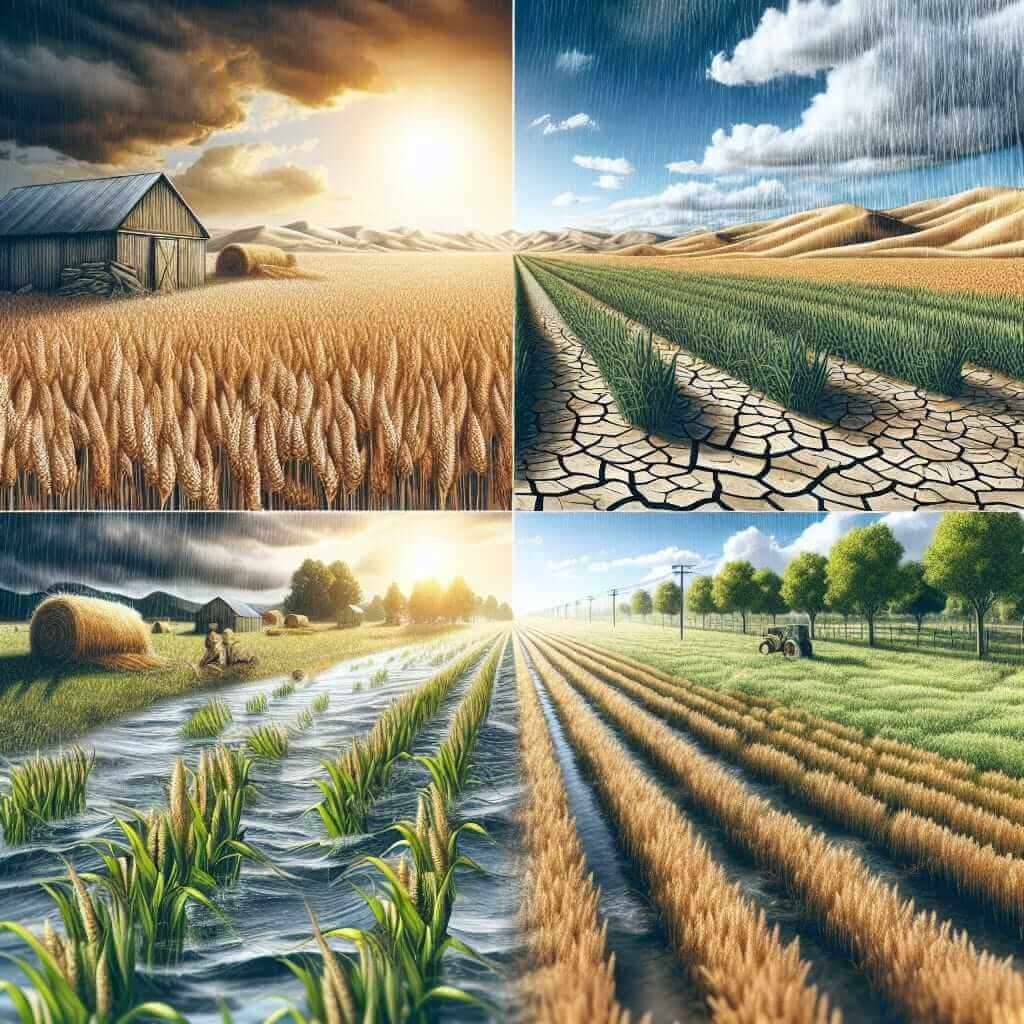The IELTS Reading test is a critical part of the IELTS exam, assessing candidates’ ability to understand and interpret written English. This section includes various topics that are both relevant and prevalent in today’s world. One such topic is the impact of climate change on global agricultural supply chains, a subject that intersects climate science and economics and has been increasingly featured in recent exams. Understanding this topic not only helps in answering related questions effectively but also enhances your knowledge of current global issues.
Main Content
Sample IELTS Reading Passage
This passage is a Medium Text extracted from recent discussions and articles on climate change and its effects on agriculture.
The Impact of Climate Change on Global Agricultural Supply Chains
Climate change has become a foremost challenge of our time, significantly affecting the agricultural sectors worldwide. Changes in temperature, precipitation patterns, and the frequency of extreme weather events have directly impacted crop productivity and livestock health. These environmental changes disrupt traditional farming practices and pose a serious threat to global agricultural supply chains.
An analysis by the International Panel on Climate Change (IPCC) indicates that a 1.5°C increase in global temperature could reduce crop yields by 10%. Moreover, droughts and floods, exacerbated by climate change, can devastate farming regions, leading to a decrease in overall food production and potential global food shortages. This fluctuation in agricultural output affects both the availability and the price stability of food products in the market.

Furthermore, climate change impacts not just production but also the agricultural supply chain’s logistics. Transportation infrastructure, essential for moving agricultural products from farms to markets, is susceptible to damage from extreme weather events. Roads, ports, and storage facilities can be compromised, leading to delays and increased costs. For instance, the 2011 floods in Thailand severely disrupted rice exports, causing a significant rise in global rice prices.
Sample IELTS Reading Questions
Question Type: Multiple Choice
-
What is the primary focus of the passage?
A. The rise in global temperatures.
B. The effects of extreme weather on urban areas.
C. The impact of climate change on agricultural supply chains.
D. The economic consequences of agriculture diversification. -
According to the passage, how does a 1.5°C temperature rise impact crop yields?
A. It increases crop yields by 10%.
B. It reduces crop yields by approximately 10%.
C. It has no significant impact on crop yields.
D. It doubles the crop yields.
Question Type: True/False/Not Given
- The IPCC report suggests that climate change will benefit certain crops. (True/False/Not Given)
- The floods in Thailand in 2011 had no significant effect on the global market. (True/False/Not Given)
Answer Keys and Explanations
-
Answer: C
- The passage mainly discusses how climate change affects agricultural supply chains.
-
Answer: B
- The passage states that a 1.5°C increase in temperature could reduce crop yields by approximately 10%.
-
Answer: False
- The passage does not mention any benefits of climate change on crops according to the IPCC report.
-
Answer: False
- The passage explains that the 2011 floods in Thailand significantly disrupted rice exports and raised global rice prices.
Common Errors and Tips
- Understanding Context: Many candidates fail to relate the impact described in the passage to real-world scenarios. Always visualize the context.
- Precision in Responses: Avoid making assumptions beyond the provided text. Stick to the information explicitly mentioned.
- Practice Varied Questions: Familiarize yourself with different question types, especially Multiple Choice and True/False/Not Given.
Vocabulary and Grammar
Vocabulary
- Precipitation (n) [prɪˌsɪpɪˈteɪʃən]: rainfall or snow.
- Exacerbate (v) [ɪgˈzæsərˌbeɪt]: to make something worse.
- Logistics (n) [ləˈdʒɪstɪks]: the detailed coordination of complex operations.
- Infrastructure (n) [ˈɪnfrəˌstrʌkʧər]: the basic physical and organizational structures needed for the operation of a society.
Grammar Point
- Conditional Sentences: E.g., “If the temperature increase to 1.5°C, it could reduce crop yields by 10%.”
- Passive Voice: E.g., “These environmental changes are caused by…”
Conclusion
Studying the impact of climate change on global agricultural supply chains not only equips you with topical knowledge but sharpens your reading and comprehension skills for the IELTS Reading test. To score high, practice regularly with authentic IELTS materials and focus on honing your understanding of complex passages.
For additional resources on related topics, you can visit How is Climate Change Affecting Global Agricultural Supply Chains? and How is Climate Change Impacting Global Food Supply Chains?.
Prepare steadfastly, and good luck with your IELTS Reading test!